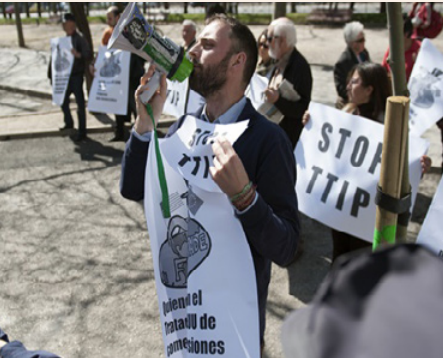
Although it still has not been implemented, the free trade agreement being negotiated between the United States and the European Union (TTIP) is a relic of the dominant economic theory. With this they are trying to sell us that globalisation is the end of history, that competition is the most efficient way of organizing an economy and to generate wealth and employment, we must grow. However, the three tenets are simply erroneous and therefore the problem is not the TTIP colour, rather its root. The TTIP runs in the opposite direction to the demands of the majority of society. Let us review the main myths of the TTIP and introduce eco-social alternatives to an economic model based on, why not, a possible, fair and sustainable transatlantic cooperation.
Myth 1: Globalisation is the end of history
Today's globalisation is nothing but an extraordinary accumulation of energy (and consequent CO2 emissions) so that a minority of humanity can produce and consume more and more, in a world turned into a global market. However, as explained to the Pope Francisco in his encyclical "Laudato Yes" that globalisation is over: in addition to the necessary solidarity, there is no more cheap fossil energy, nor enough atmosphere for such predation.
- However, it seems that the promoters of the TTIP live in a parallel dimension completely detached from the energy and material reality we live in. With Business As Usual as the only horizon, that is to say, go ahead using the current system, with the same guidelines as those that have brought us here, the TTIP want to step on the gas and fossil predatory globalisation:
- End any restrictions on exports of "energy products", giving new priority to the most dirty and polluting energies of the past such as coal, oil or gas (section C2 of the European Commission draft September 2013);
- Facilitate the exploration and exploitation of oil by multinationals in the US and the EU, opening the door to fracking and its disastrous consequences on the environment and climate (section H);
- Make it impossible for any country to take measures that favour knowledge, technologies and local companies, thus curbing the development of renewable energies. Article O of TTIP indicates, for example, that countries "must not adopt or maintain measures that foresee "local demands";
- The European Commission itself has acknowledged that the TTIP will -given that it encourage transatlantic transport- increased CO2 emissions. That is, entirely contrary to the goals of a 40% reduction of emissions for 2030 and COP21, the big climate summit in Paris in December 2015.
Against this irresponsible, "Titanic strategy", a sensible strategy, that is to say, less energy-intensive and polluting, goes through the relocation of much of our trade and economies. Our future and that of our children is not conducive to building "short circuits" that allow us, as much as possible, locally consumed food and energy that we produce locally without many intermediaries, and giving more space to ourselves and own consumption. Within a global cooperative network (see next item), we talk about an economy that takes root in the local, favours quality products and with strong ecological and social added value and builds community from the bottom up and brings production and consumption decisions closer to ordinary people. In the end, a more human, more sustainable and more democratic economy







